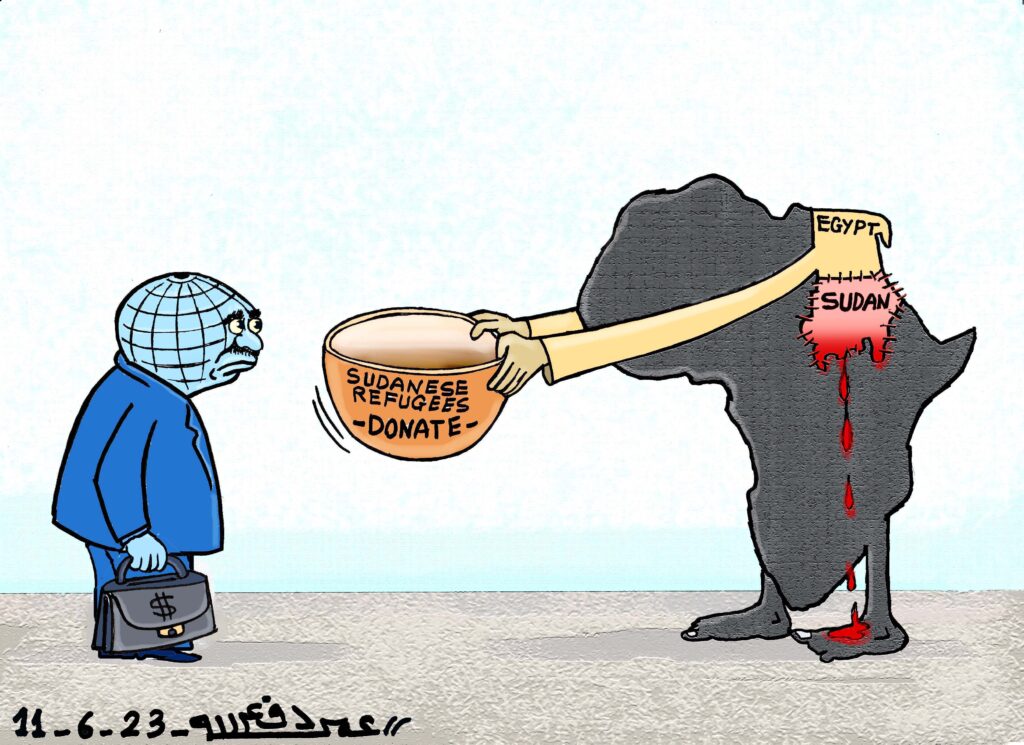Egypt suspends studies in Sudanese schools

Sudanese refugees in Egypt asking for aid (Cartoon by Omar Dafallah / RD)
Egyptian authorities have decided to temporarily suspend studies in Sudanese schools in Egypt. This decision has been met with widespread condemnation from Sudanese families residing in Egypt and from those engaged in public affairs.
Families whose children are in enrolled in Sudanese schools in Cairo, the capital of Egypt, have received letters informing them that studies will be suspended from Wednesday, June 26, until July 7. The letters explained that Egyptian authorities issued this decision, requiring schools to “adjust their conditions in line with necessary approvals after a review”.
Mortada Ibrahim, a leader in the Popular Congress Party (PCP), told Radio Dabanga that the decision is “cultural rather than political”. It cannot be viewed in isolation from other measures taken by Egyptian authorities regarding the Sudanese presence in Egypt.
“The presence of Sudanese schools in Egypt, along with their newly amended curricula, contradicts many recent Egyptian policies towards Sudan.” He pointed to past incidents, such as the closure of Sudanese-run barber shops and cafes in Cairo, which were shut down due to Sudanese maps depicting the Halayeb Triangle* as Sudanese territory.
The decision poses a major challenge for Sudanese families in Egypt. The current alternatives include enrolling their children in Islamic El Azhar schools, which he described as a long and complicated process, or in international schools, which are financially burdensome for Sudanese families. He also expressed concern that the Egyptian authorities might introduce new measures to prevent Sudanese students from enrolling in Egyptian schools.
The decision is “another form of pressure from Egyptian authorities, similar to when buses carrying Sudanese were sent back to Sudan”. Ibrahim also highlighted social media campaigns by some Egyptians against the presence of Sudanese refugees in Egypt, which he sees as reflecting the Egyptian government’s policy towards Sudan.
Downplaying the impact of the Sudanese presence in Egypt, the politician noted that the number of Sudanese registered with the UNHCR in Egypt “does not burden the UN organisation”. Most Sudanese in Egypt, he said, rely on their own resources and support from families abroad.
He criticised the Ministry of Foreign Affairs and the Sudanese Embassy in Cairo for failing to address issues faced by Sudanese nationals in Egypt, especially regarding education. He urged the embassy to intervene in the decision to suspend studies, insisting that the process should be gradual and smooth, “as such decisions affect the fate of generations”.
Around 500,000 people have fled Sudan to Egypt since the onset of war between the Sudanese Armed Forces (SAF) and the paramilitary Rapid Support Forces (RSF) in mid-April 2023, according to the International Organisation for Migration (IOM). By April 27 of last year, more than 20 buses were arriving at the Argeen border crossing daily, a number that soon doubled.
In April, Radio Dabanga reported that thousands of Sudanese refugees who escaped to Egypt have been detained by Egyptian authorities in a network of secret military bases and then deported back to their war-torn country, often without the chance to claim asylum.
Earlier this month, hospitals in Aswan received dozens of bodies of Sudanese who died en route to the southern Egyptian town, many from scorching heat.
*The Halayeb Triangle is a disputed region between Egypt and Sudan, located on the Red Sea coast. The area, approximately 20,580 square kilometres, has been under Egyptian control since the 1990s, but Sudan also claims sovereignty. Tensions have flared between the two countries. The dispute is a result of the discrepancy in the demarcation of a “political boundary” set in 1899 by the Anglo-Egyptian Condominium and an “administrative boundary” set by Britain in 1902. The Egyptian army seized control of Halayeb after a failed attempt by Islamists, backed by Sudan, to assassinate the then Egyptian President Hosni Mubarak in Addis Ababa in 1995. (Source: Wikipedia)











 and then
and then